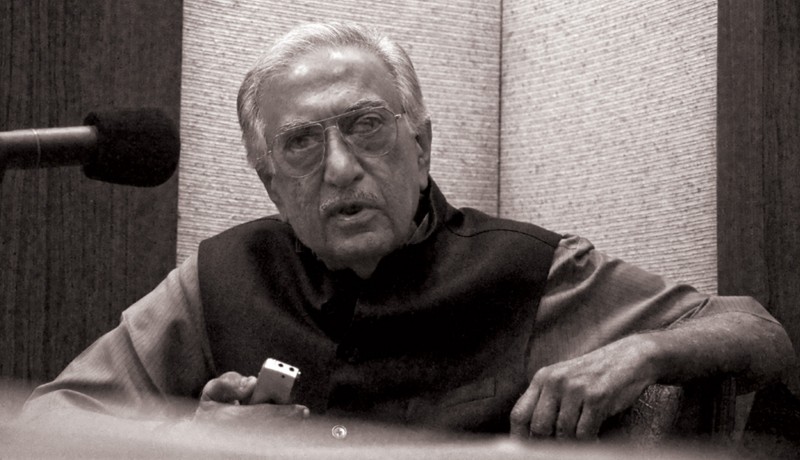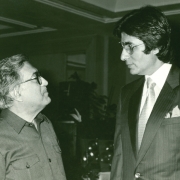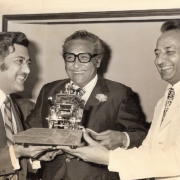
People

His voice has spawned a thousand imitations. Yet veteran radio presenter Ameen Sayani is not weighed down by his legendary aura. The 78 year-old is no longer as active on Indian radio as he used to be, but his tryst with old melodies isn’t over yet. Busy compiling rare old songs for the fourth volume of a CD series, he tells Rajashree Balaram why he will always root for music that touches the soul
A persistent cough is bothering Ameen Sayani. So much so that we briefly wonder if we should reschedule the interview. As he chews on mints to soothe his throat, the greedy voice in our head prods us to be patient. Sayani tries out his voice on the recorder and shares some mints with us—not ‘mints with holes’ but sweet mentholated diskettes that remind us of the mints we used to have in our childhood.
Everything about Sayani takes us back in time to a simpler, subtler world. All the paraphernalia that surround him provoke nostalgia: the old-fashioned wooden showcase in his reception filled with trophies and awards; ledgers and files crammed in his office space; his office, located in an Art Deco building on the busy Colaba Causeway in Mumbai; and above all, the man himself. His voice transports us to a time when we used to adjust the knob on the transistor with feverish anticipation till we heard him calling out in his signature style “Bhaiyon aur behenon”…a greeting that seems to be long discarded in public speech.
It took us more than a month to pin Sayani down for an interview. He has been busy promoting a CD compilation of old songs, Geetmala Ki Chaon Mein, songs culled from his famous radio show Binaca Geetmala, which kept listeners all over India and Asia hooked to their radio set for 45 years since 1952. Awarded the Padma Shri in 2009, Sayani’s life has been hectic with assignments: packaging shows for international radio stations, composing ad jingles, and hosting events. So when he says, “I no longer have the drive I used to,” we find it hard to believe him. The man who once put in 16 uninterrupted hours at work now needs a one-hour nap in his office chair. His oeuvre, though, remains unparalleled and needs no rejuvenation.
IN HIS OWN WORDS
I never left radio. I admit that in Mumbai my voice has not been heard for the past seven years or so on Vividh Bharati. But I was active on another radio station till about six years ago through a programme, Sangeet Ke Sitaron Ki Mehfil. When that stint came to an end, the programme was aired on radio stations in New York, Dubai, New Zealand and Fiji. Then came the recession and things went a bit shaky in broadcasting.
I have had very enjoyable and successful stints with Radio Sunrise, BBC World Service and its Ethnic Network. About a year ago, I had a year-long stint on air in Bihar, Uttar Pradesh, Madhya Pradesh and Chhattisgarh. In Mumbai, I enjoyed a brief stint of six episodes on Radio City while promoting my CD series, Geetmala Ki Chaon Mein. It was broadcast in the afternoon and late night slot.
The compilations on my CD series Geetamala Ki Chaon Mein is derived from my famous show Binaca Geetmala, which was one of the most avidly and widely heard radio shows in the world. In the 1950s and ’60s, it was estimated that all over Asia—even going up to East Africa—Binaca Geetmala had drawn over 200-210 millions of listeners every week. I was amazed to discover that thousands of people still have diaries that contain not just the annual programme list of songs, but also the weekly programme list dating back 46 years. In fact, there is a professor in Jaipur who has written a book on Binaca Geetmala, which contains details even I don’t have.
Geetmala Ki Chaon Mein trains the spotlight on songs that did not gain the sunlight of popularity. These songs, therefore, were not part of the annual programme list on Binaca Geetmala. Nevertheless, there were many such fabulous songs that were left in the shade. I want to rejuvenate them. I have already launched three volumes that contain rare masterpieces along with interviews with legendary actors, singers and musicians. Part of it is based on the racy old style of Binaca Geetmala and part of it is gentle. It has a blend of everything: self-deprecating humour; my take on the Partition; trivia; anecdotes; social messages; nostalgia; my love story; my first visit to Radio Ceylon; and little snippets on human behaviour.
The great music composer Naushad always said that songs back then touched the soul. I agree with him. Towards the end of the 1970s and beginning of the ’80s, the great voices slowly started fading out. I refer to those years as the golden period of Indian music. The lyrics and composition back then—whether romantic, philosophical or simply fun—found their way into our soul. Music today touches the body, which is also a good thing. In today’s music there is a lot of jhoomna jamna, so even old people like me feel like getting up and dancing [laughs]. It keeps us young and active and healthy.
Music is like a river whose origins lies far away in our past. It keeps flowing through every era and, on its way, it collects treasures from all the shores it passes, and redistributes those treasures as it moves forward. So there is a link between the past and the present and tomorrow—that’s how all great civilisations and great music ought to be. No matter how much we experiment with form, let’s not move too far away from the origins of our existence. Songs back then were inspired by classical and folk music. Slowly, we imbibed orchestral and vocal styles from the west and arrived at a harmony that resonated with the best of both worlds. Pancham [R D Burman], for instance, had perfected that skill.
Not just in music, but every facet of life, we should learn from the past, mould it for the present and branch out into tomorrow. It’s our history that shows us where we erred and where we excelled.
People complain that there is too much of needless shor [cacophony] on radio nowadays, but how can you blame the presenters? Each presenter is on air for three to four hours. How much can they talk? I have often suggested to radio stations to keep shorter stints for announcers and have more announcers. We could also air sponsored programmes from outside. Sponsored shows recorded outside the medium have been the backbone of every successful radio station. I have also been urging stations to bring back songs from the golden era. I am happy to note that now many FM stations have devoted time to such songs.
I tell young radio jockeys to develop a unique style that’s characteristic to their personalities. I urge them to speak to their friends, observe the world around them, and read as much as they can. I used to teach at the Xavier Institute of Communications. I get to interact with a lot of budding RJs. Often they meet me for an interview. I enjoy these interactions.
I developed my style and command over the language while working on the monthly journal that my mother edited and published. My mother Kulsum Sayani was Gandhiji‘s shishya [disciple]. Gandhiji told her to start a journal for neo-literates, written in simple Hindustani, but in three scripts: Urdu, Devnagari and Gujarati. I assisted my mother on her journal Rehbar and while doing so, I absorbed the finer nuances of Hindi and Urdu. That experience helped me use the simplest form of the common denominator language while broadcasting.
I come from a family that has been deeply associated with the freedom movement. My great uncle was an associate of Gandhiji. My grandfather was Gandhiji’s physician. I have grown up watching these great leaders and these influences have made me a composite person. I want my work to encompass the whole of India, its spirit and the ethos of the world.
I have had some wonderful friendships in the industry. I shared a great rapport with Raj Kapoor. He was my elder brother Hamid’s classmate in school. Once Raj and Hamid were part of the same elocution competition and though my brother gave a much better speech, Raj was far more popular. He would saunter in, chew gum and grin. At that time I resented him. But when I started broadcasting, I was part of the team that did the publicity for Barsaat. Then, from Sangam onwards I took over the radio publicity for all his films. By then, I was fascinated by his charm and speech. He could speak his way into your heart.
I never thought much of Raj as an actor, but as a director he was fabulous. I remember an interesting incident during the publicity of Mera Naam Joker. Typically, I never did publicity without seeing a film. For some reason, Raj didn’t show me the film before release. I decided to do something different. I went to a senior recordist Madgaonkar saheb and asked him to offer reverb effect to my voice when I announced the name of the film. He gave me simulated reverb. We placed a speaker in the staircase and I announced the title with a flamboyant flourish. After the campaign went on air, I saw the film; I was stunned. I told Raj that the publicity was all wrong. Here was a movie where the central character is heartbroken repeatedly. The title, therefore, should be announced with a sigh. As expected, people went to watch the film expecting a lot of fun and were disappointed. Years later, when Bobby was released, I worked out a campaign that became very popular—it had a boy and girl fall in love and talk to each other about the film on air.
I was also close to Sunil Dutt. Before he started acting, he too was in broadcasting. At events, he used to come with his microphone and interview celebrities, and I would conduct my interviews alongside. We bonded at those times and that friendship lasted till the day he died. He was adamant by nature, yet gentle. If he latched onto something he would see it through. We were hoping he would be the prime minister one day. Sadly, fate had other plans.
Mehmood was one of my most outrageous friends. He was crazy and courageous and kept everyone in splits. While directing Bhoot Bangla he insisted I act in the film. Though I love to act, I told him I didn’t want to be a comedian if I couldn’t be the hero. He said “Ameen bhai, you will play exactly what you are in real life, an announcer.” So I have had my brief stint in acting. I believe Shashi Kapoor is the nicest person in the film industry. He is humble, soft-spoken, understanding and a delight to work with. I still think Kalyug was one of the best films in Indian cinema. We are in touch, though many of the people I was close to are no longer there.
Kishore Kumar was funnier than what he appeared on screen. We have gone out on many outings in his old Chalti Ka Naam Gaadi car. He used to drive everyone around the bend. Once he was scheduled to do an interview with me for …Geetmala. He kept stalling right till the end. A day before the broadcast, he asked me to meet him at a studio in the suburbs. I hired a cab and lugged the tape recorder with me. When I reached the studio, I was told that Kishore was not planning to come. I was so angry that I didn’t approach him for any interview for the next 12 years. Then he approached me to do publicity for Door Gagan Ki Chaon Mein. When S D Burman died, Kishore was shattered. I interviewed him for the tribute to S D and the one-hour tribute that he offered went on to become one of my favourite shows.
Time changes not just the world around us, but our attitude towards the world as well. Now people listen to radio while they are on the move. Back in our days, we used to make time to listen to songs. Even while studying, the radio would play in the background. That does not happen any more. A lot has changed with the arrival of new FM stations, though Vividh Bharati still retains the old-world charm. For many years, I was disturbed to hear FM stations playing only current dhoom dhaam numbers. With the advent of sophisticated broadcasting equipment all the programming was done automatically; the equipment selects the songs, schedules the breaks…everything is chalked out beforehand. So the presenter is left with nothing to do but yap. I feel sad about that because we have some good announcers today.
I no longer have the drive and zest I used to. I think it ebbed after my wife’s death in 2002. Sometimes I feel sad; I didn’t give her the time I did when I was younger. Life used to be hectic then. In 1961-62, I used to handle two jobs: one at AIR and one in the marketing and publicity division of TOMCO. Mornings would be spent at TOMCO; lunchtime for recording at Radio Ceylon; Back to TOMCO till six in the evening, and recording a show till 10 at the radio station. Even my weekends were spent at the radio station.
As a soul immersed in commercial broadcasting, I gave up all my loves. I was very fond of poetry but I rarely had the time to develop that passion. My greatest love is classical music. I have learnt classical music, and I have attended all the big baithak and shows. But radio overshadowed everything. I was also fond of acting on stage. I used to act in a lot of Hindi, Gujarati and English plays in college. I have even been directed by Adi Marzban. Now I have no time left for any of those things. I begin my day at 7 am. We are a small family—just me, my son and daughter-in-law. We have chores assigned for each person. I chop the fruits for breakfast and lay the table. Then I do the mudra pranayama for 45 minutes. By the way it’s the laziest pranayama in the world [laughs]. I reach office at 11.30 am, then take a nap in the afternoon and get back to work. I have no grandchildren so I treat all young children as my own grandchildren.
All my life, I have worked and focused on one central theme that is an intrinsic part of my ethos: the disintegration in human and international relationships. Through my programmes, I have always tried to create a kind of pleasant atmosphere that is conducive to friendship, unity, peace and justice. I also feel one of the greatest ways of achieving that friendship and unity is to clean up the way we communicate. One reason for all the mess in our country is the lack of clarity in our communication. I would like to have a world that is peaceful, clean, healthy and gentle. Which reminds me of Kishore Kumar’s famous song: Aa chal ke tujhe main leke chaloon, ek aise gagan ke tale, jahan gum bhi na ho, aasoon bhi na ho, bas pyar hi pyar palein….
Photo: Utkarsh Sanjanwala Featured in Harmony – Celebrate Age Magazine September 2010
you may also like to read
-
For the love of Sanskrit
During her 60s, if you had told Sushila A that she would be securing a doctorate in Sanskrit in the….
-
Style sensation
Meet Instagram star Moon Lin Cocking a snook at ageism, this nonagenarian Taiwanese woman is slaying street fashion like….
-
Beauty and her beast
Meet Instagram star Linda Rodin Most beauty and style influencers on Instagram hope to launch their beauty line someday…..
-
Cooking up a storm!
Meet Instagram star Shanthi Ramachandran In today’s web-fuelled world, you can now get recipes for your favourite dishes at….









